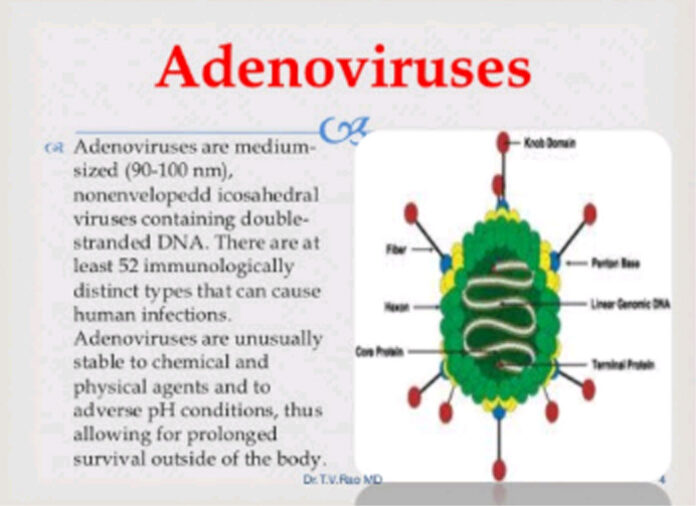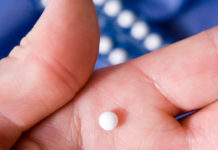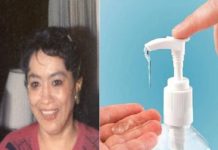Adenoviruses can cause mild to severe illness, though serious illness is less common. People with weakened immune systems, or existing respiratory or cardiac disease, are at higher risk of developing severe illness from an adenovirus infection.
Adenoviruses can cause a wide range of illnesses such as
common cold or flu-like symptoms
fever
sore throat
acute bronchitis (inflammation of the airways of the lungs, sometimes called a “chest cold”)
pneumonia (infection of the lungs)
pink eye (conjunctivitis)
acute gastroenteritis (inflammation of the stomach or intestines causing diarrhea, vomiting, nausea and stomach pain)
Less common symptoms of adenovirus infection include
bladder inflammation or infection
neurologic disease (conditions that affect the brain and spinal cord)
How does adenovirus spread?
Like colds and flus, adenovirus infections usually spread through respiratory secretions when someone coughs or sneezes.
But these stubborn viruses are tougher than cold and flu viruses: They can live for a long time on surfaces like doorknobs or towels and they are resistant to many common disinfectants. This makes them very easy to spread from one person to another.
Adenoviruses can also be spread through fecal contamination—for instance, when diapers are changed or in swimming pools.
Adenovirus outbreaks tend to occur more often in indoor environments like nursing facilities or in schools or military barracks.
In the event of an outbreak at your child’s school or daycare, should you keep them home?
Sometimes the virus can be shed (released from the body) for a long time after a person recovers from an adenovirus infection, especially among people who have weakened immune systems. This “virus shedding” usually occurs without any symptoms, even though the person can still spread adenovirus to other people.
As long as your child is healthy without any immunodeficiencies, there is no need to keep them out of school during an outbreak since the viral disease ultimately resolves on its own without treatment and without long-term complications.
But if your child suffers from a weakened immune system, it would be best to keep them out of school and at home until the outbreak has been appropriately managed.
Is there a specific treatment for children versus adults?
Dr. Belgarde: Treatment for children and adults is the same. The body’s immune system fights the viral infection and it typically resolves in 5-7 days.
Antibiotics do not treat viral infections. Treatment typically consists of supportive care, such as rest, fluids, or over-the-counter fever relievers. Antiviral agents are only used to treat severe adenovirus infections in people with suppressed or low immune systems.
Prevention:
Follow simple steps to protect yourself and others:
You can protect yourself and others from adenoviruses and other respiratory illnesses by following a few simple steps:
Wash your hands often with soap and water for at least 20 seconds (see CDC’s Clean Hands Save Lives! ).
Avoid touching your eyes, nose, or mouth with unwashed hands.
Avoid close contact with people who are sick.
Adenovirus is easily spread by our hands to our eyes, nose, and mouth, so thoroughly washing with soap and water for 20 seconds—especially before and after touching your face or after using the bathroom—can really reduce your risk.
Just like with the cold and flu, avoid close contact with those who are sick. If you are sick and have to sneeze or cough, do so into the crook of your elbow to keep your hands clean.
. Stay home when you are sick.
. Cough and sneeze into a tissue or your upper shirt sleeve, not your hands.
. Avoid sharing cups and eating utensils with others.
. Refrain from kissing others.
. Wash your hands often with soap and water for at least 20 seconds, especially after . . using the bathroom.
Frequent handwashing is especially important in childcare settings and healthcare facilities.
Maintain proper chlorine levels to prevent outbreaks:
It is important to keep adequate levels of chlorine in swimming pools to prevent outbreaks of conjunctivitis caused by adenoviruses. CDC’s Healthy Swimming website provides more information on how to maintain healthy and safe swimming environments.
Treatment:
There are no approved antiviral medicines and no specific treatment for people with adenovirus infection. Most adenovirus infections are mild and may be managed with rest and over-the-counter pain medicines or fever reducers to help relieve symptoms. Always read the label and use medications as directed.
Is there a specific treatment for children versus adults?
Dr. Belgarde: Treatment for children and adults is the same. The body’s immune system fights the viral infection and it typically resolves in 5-7 days.
Antibiotics do not treat viral infections. Treatment typically consists of supportive care, such as rest, fluids, or over-the-counter fever relievers. Antiviral agents are only used to treat severe adenovirus infections in people with suppressed or low immune systems.


















































